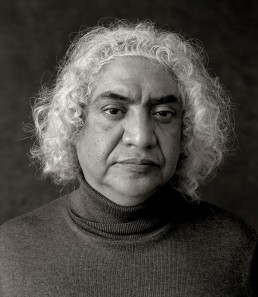S2: Episode 1 - Alejandro

Episode Information
[Intro Music]
Narrator: Welcome to Hunger and Resilience, narrative histories about the complexity and experiences of hunger. A traveling exhibition and weekly podcast edited and hosted by Michael Nye, supported by the San Antonio Food Bank, Eric Cooper, executive director. We are grateful for the honesty and eloquence of every voice. Episode one, Alejandro.
Alejandro: I remember it was summer, it was hot and it was dry and dusty. The backyard was huge. And I remember my mother watering the dirt in the morning, wetting that dirt so that it wouldn’t be dusty. We had a pecan tree. It was so glorious and majestic and strong and, and, uh, healthy. I, I remember it that it was gonna be lunch and there wasn’t any food in the house. It’s very hard to describe the physical aspects of hunger. It’s like you, you have a lion in your stomach that wants to be fed. My sister gathered us and she said that we were going to gather pecans for lunch. Luckily, for our sake, she had made a game of it because we, we were hungry. It was hot. Boy, it was hot. And there’s this, um, longing for it to get better. We each got like a mayonnaise jar and everybody is randomly cracking their pecans. That sound, I could hear that sound of that shell cracking. There’s a sweetness about my sister. She’s got great deep compassion and love. And I remember her going back inside, you know, those old doors, those screen doors that slam. And she came back out with these plates and salt, and it was like we were going to eat a steak. I was starving and my sister was, uh, was caring for us.
So we get our little piles of pecans and put ’em on the plate and put salt and begin to eat ’em. They taste it like salty dirt. It satisfied the hunger. But as I look at it now, the feeling that I was dealing with at the time was probably shame. I think the hardest thing is that my parents have done the best that they know with what they had. This idea of hunger goes deeper in the sense that I probably was starved for my mother’s affection, for her compassion, for her caringness, but she was so occupied with other things. I hungered for food a lot. I hungered for peace. There is this emptiness that makes you afraid of the world in a sense. I think the gift of being hungry is that it’s made me strive for more. My issues with life of self-worth, of knowing that I’m enough, that I have enough, that my work is enough, go back to not having enough food. It leaves a scar. But because of that, it’s been a catalyst to do more in my life and to share what I, what I have. Now when I have a hard time, I have to remind myself it’s gonna be okay that I made it through, that I can provide for myself. That there is, there’s always gonna be a pecan tree.
[Outro Music]
Host: This podcast series, season two is about the experience of hunger. Close up, not from a distance. Most of the people I met struggled to find the right words to describe the weight of responsibility, the feelings of shame and invisibility of kindness, the mystery of not knowing and of dignity.
In this first episode, I would like to say a few words about the history of this project. I spent two to three days with each person. The conversations were collaborative. The traveling exhibition was a combination of large black and white portraits and audio narratives. An audio box and headphone was installed under each portrait. The exhibit has traveled to over 50 cities, including the Witty Museum, Feeding America National Conference, St. Louis History Museum, Texas State Capital in Austin, Starbucks National Conference, McGovern Museum of Health, Philanthropy Southwest Conference, Albrecht Kemper Museum of Art, an abandoned building, many libraries, galleries, universities, and food banks.
A voice has a power. There is so much misunderstanding, circling around the reasons and causes of hunger. What I heard, what I saw included mental illnesses, drug and alcohol addiction, severe physical injuries and pain, old age, lack of an education, loss of a job, mistakes, teenage pregnancy, health related illnesses like cancer, diabetes, heart disease, released from a prison, chance, natural disasters, floods, fires, tornadoes, hurricanes, homelessness, childhood neglect, childhood hunger, generational poverty. So many families choose between paying rent or buying food. Explanations and solutions are profoundly complex. Food banks and other relief organizations, churches, food pantries; provide food and opportunities. These narratives are about not forgetting about our shared humanity, about our shared fragility, about understanding what does it feel like to be that person. I’m Michael Nye, and this is about Hunger and Resilience. Please subscribe, rate, and review this podcast. You can also go to my website, michaelnye.org/podcast for portraits and transcripts. Thank you so much for listening.
